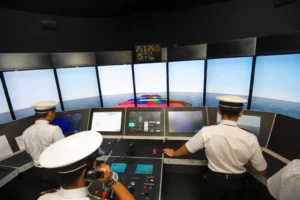By 2030, the global maritime sector is expected to continue to develop rapidly, spurred by several main factors. Among them is the continouos growth of international trading, which created demands for maritime transport services. These include the transport of goods, oil, gas, and passengers.
In addition, issues such as climate change and environmetal sustainability are also related to maritime issues. Extreme weather prediciton and the rise in sea water level has also forced the maritime indusry to take proactiv measures in an effort to protect the sustainability of the oceans and beaches.
The development of the maritime sector will also create opportunities for countries to widen the infrastructure of ports and logistics facilities. This will provide a positive impact to the local economy and create new employment opportunities.
The overall growth of world trade has created a demand for professional labour in the maritime sector. Every eyear, international trade has experienced a significant increase that has caused the demand for commercial vessels, such as container ships, bulk carriers, and tank ships, to rise.
Advancement in the maritime technology, such as the application of IoT, automation, and AI, has created a demand for skilled professional labour in the these fields. Management of ships that employ sophisticated technology requires technicians and engineers who are skilled in the repair, maintenance, and operation of equipment used in the maritime sector.
The need for professional labour with qualification in the maritime field has kept increasing. This includes safety engineers, safety inspection officers, port managers, port operations officers, and marine engineers who are experts in managing the systems used in the shipping and port sectors.
Educational and training programmes in the maritime field also play an important role in providing qualified professional labour for the industry. Various higher learning institutions offer academic programmes related to the maritime field, including Universiti Malaysia Terengganu (UMT). Prospective students especially SPM and college leavers are advised to explore the maritime field of study to grab the available opportunities in the maritime sector. Interestingly, the maritime field not only offers a career in the country but also around the world. Among the specializations that can be considered are sailing, mine engineering, nautical science, ship design, logistics, supply chain management, and maritime management.
Dr. Izyan Munirah Zaideen, senior Lecturer at the Faculty of Maritime Studies, said the maritime field is the biggest field that contributes towards the economic growth through the various subsectors.
“Malaysia is classified as a maritime country based on its geographical location, which is at the main entryway to international trade.
“The application of the Industrial Revolution 4.0 (IR 4.0) inline with the present policy and initiative can provide benefits especially for the shipping sector. This in turn can reel in investment to the sector through trading activities.
“Generally, the maritime industry includes several sectors such as ports and shipping, tourism, and fisheries.
“All these sectors are able to provide a very positive impact to the economic growth of Malaysia and help the country achieve its aims of achieving the status of a developed country,” she said.
She added a sustainable maritime industry is a fundamental to the economic prosperity of Malaysia, providing employment opportunities, generating investment, and creating other possibilities that will benefit the whole society.
Published by:
Corporate Communications Office
Universiti Malaysia Terengganu



